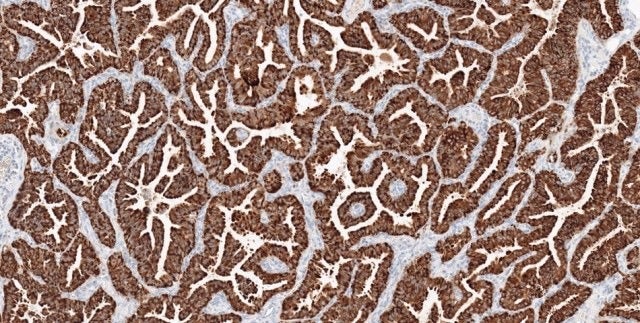
Ventanna ROS1 (SP384) Rabbit Monoclonal Primary Antibody is claimed to be the first and only in vitro diagnostic ROS1 IHC assay.
The test has been developed to detect the presence of ROS1 protein in tissue, helping to identify ROS1-positive cancer cases.
According to the company, guidelines from the College of American Pathologists and the National Comprehensive Cancer Network recommend ROS1 testing for confirmed lung adenocarcinoma cases.
The ROS1 IHC biomarker will effectively help in the identification of cases with elevated ROS1 protein expression before confirming by another method such as fluorescence in situ hybridization (FISH) or next-generation sequencing.
Lung cancer, which causes more than three deaths every minute, is divided into two main subtypes such as non-small cell lung cancer (NSCLC) and small cell lung cancer (SCLC).
Available for use on Roche’s BenchMark series of automated staining instruments, the Ventanna ROS1 Rabbit Monoclonal Primary Antibody is a US class I/CE in vitro diagnostic device.
Elevated ROS1 protein expression in tumor cells may illustrate indicate the presence of a ROS1 gene rearrangement.
ROS1-positive lung tumors arise predominantly in younger and non-smoking individuals, as with NSCLC tumors that are positive for ALK (anaplastic lymphoma kinase).
Roche Tissue Diagnostics head Jill German said: “Our highly sensitive ROS1 test is the first in vitro diagnostic IHC available for recommended lung cancer testing guidelines, with the added benefit of rapid turnaround time.
“While this is important in non-small cell lung cancer cases today, ROS1 is also being investigated in a number of clinical trials in other cancer types.”
Established in 1896, Roche provides medicines in oncology, immunology, infectious diseases, ophthalmology and diseases of the central nervous system.
The company also offers in vitro diagnostics and tissue-based cancer diagnostics, as well as diabetes management solutions.
Based in Basel of Switzerland, Roche carries out operations in more than 100 countries and employs around 94,000 people across the world.


